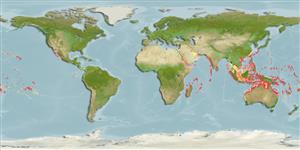Common names from other countries
>
Perciformes/Scorpaenoidei (Scorpionfishes) >
Scorpaenidae (Scorpionfishes or rockfishes) > Scorpaeninae
Etymology: Scorpaenodes: Latin, scorpaena = a kind of fish, 1706 + Greek oides = similar to (Ref. 45335).
Environment: milieu / climate zone / depth range / distribution range
Ökologie
seewasser riff-verbunden; tiefenbereich 3 - 49 m (Ref. 9710). Tropical; 30°N - 32°S
Indo-Pacific: Red Sea to the Marquesan and Tuamoto islands, north to the Ryukyu and Hawaiian islands, south to Lord Howe Island.
Size / Gewicht / Alter
Maturity: Lm ? range ? - ? cm
Max length : 14.0 cm TL Männchen/unbestimmt; (Ref. 9710)
Rückenflossenstacheln (insgesamt): 13; Rückenflossenweichstrahlen (insgesamt): 8-10; Afterflossenstacheln 3; Afterflossenweichstrahlen: 5 - 6. Interorbital area and snout scaled; small spines at midline between tympanic spines frequently present; interorbital spines present; extra spines usually present on upper rear margin of eye after supraocular spine; dorsal spine, usually non longer than orbit diameter; body often covered with small skin flaps (Ref. 10482). Distinguished from other species of Scorpaenodes by having suborbital ridge with more than 5 spinous points, usually with 10 or more in adults (Ref. 10482).
Inhabits areas of rich coral growth from near shore to the outer reef slope (Ref. 4313). Benthic (Ref. 58302). Cryptic. Venomous spines (Ref. 4313). Minimum depth reported taken from Ref. 30874.
Life cycle and mating behavior
Geschlechtsreife | Fortpflanzung | Ablaichen | Eier | Fecundity | Larven
Eschmeyer, W.N., 1986. Scorpaenidae. p. 463-478. In M.M. Smith and P.C. Heemstra (eds.) Smiths' sea fishes. Springer-Verlag, Berlin. (Ref. 4313)
IUCN Rote Liste Status (Ref. 130435)
CITES (Ref. 128078)
Not Evaluated
Nutzung durch Menschen
Aquarium: Kommerziell
Mehr Information
NamenSynonymeMetabolismusRäuberÖkotoxikologieFortpflanzungGeschlechtsreifeAblaichenFecundityEierEientwicklung
ReferenzenAquakulturAquakultur ProfilZuchtlinienGenetikElectrophoresesVererbbarkeitKrankheitenVerarbeitungMass conversion
Tools
Zusatzinformationen
Download XML
Internet Quellen
Estimates based on models
Preferred temperature (Ref.
115969): 24.5 - 28.9, mean 27.5 (based on 590 cells).
Phylogenetic diversity index (Ref.
82804): PD
50 = 0.5000 [Uniqueness, from 0.5 = low to 2.0 = high].
Bayesian length-weight: a=0.01549 (0.00905 - 0.02650), b=3.05 (2.90 - 3.20), in cm Total Length, based on LWR estimates for this species & (Sub)family-body (Ref.
93245).
Trophic level (Ref.
69278): 3.6 ±0.59 se; based on food items.
Widerstandsfähigkeit (Ref.
120179): mittel, Verdopplung der Population dauert 1,4 - 4,4 Jahre. (Preliminary K or Fecundity.).
Fishing Vulnerability (Ref.
59153): Low vulnerability (10 of 100).
